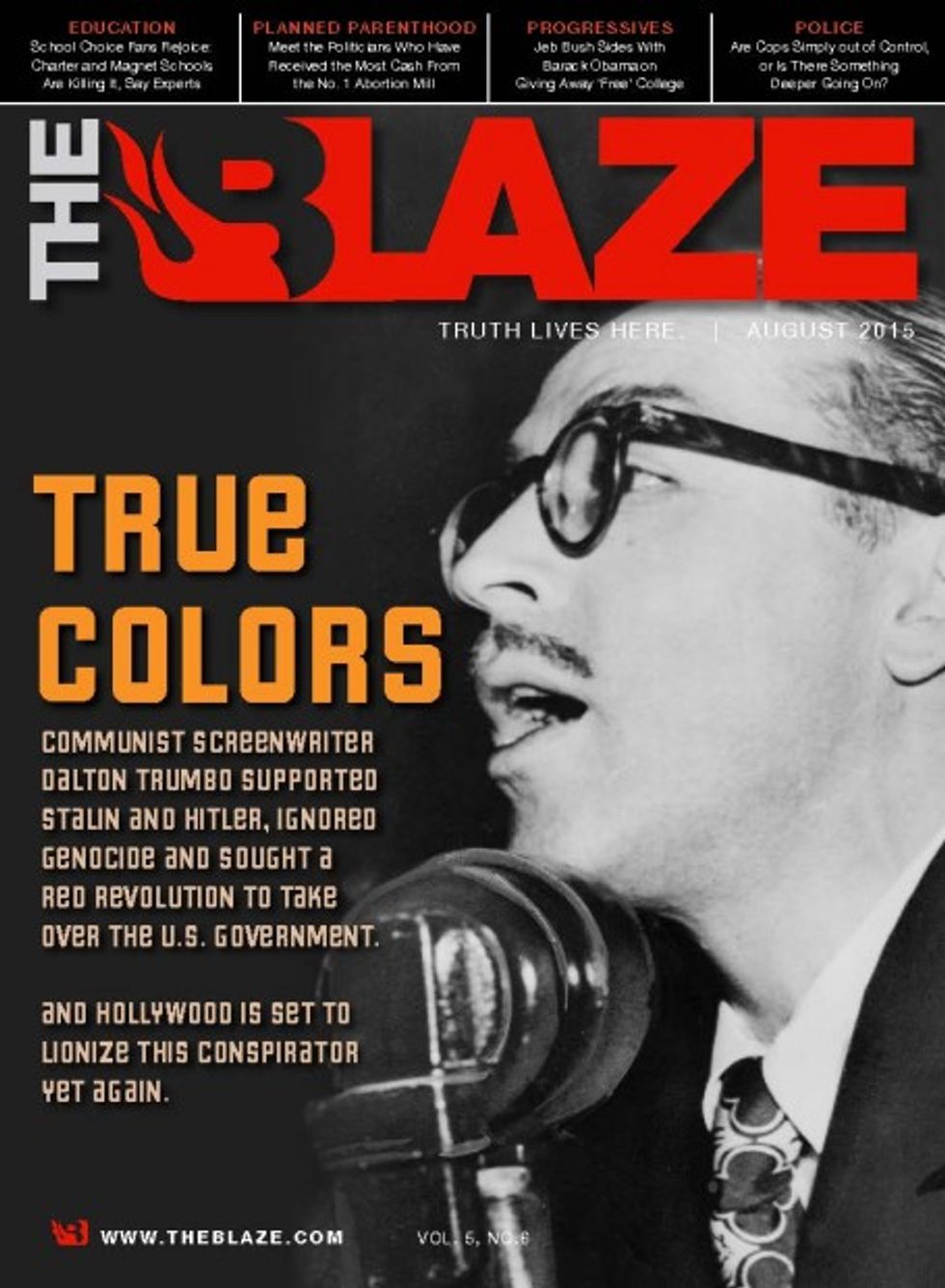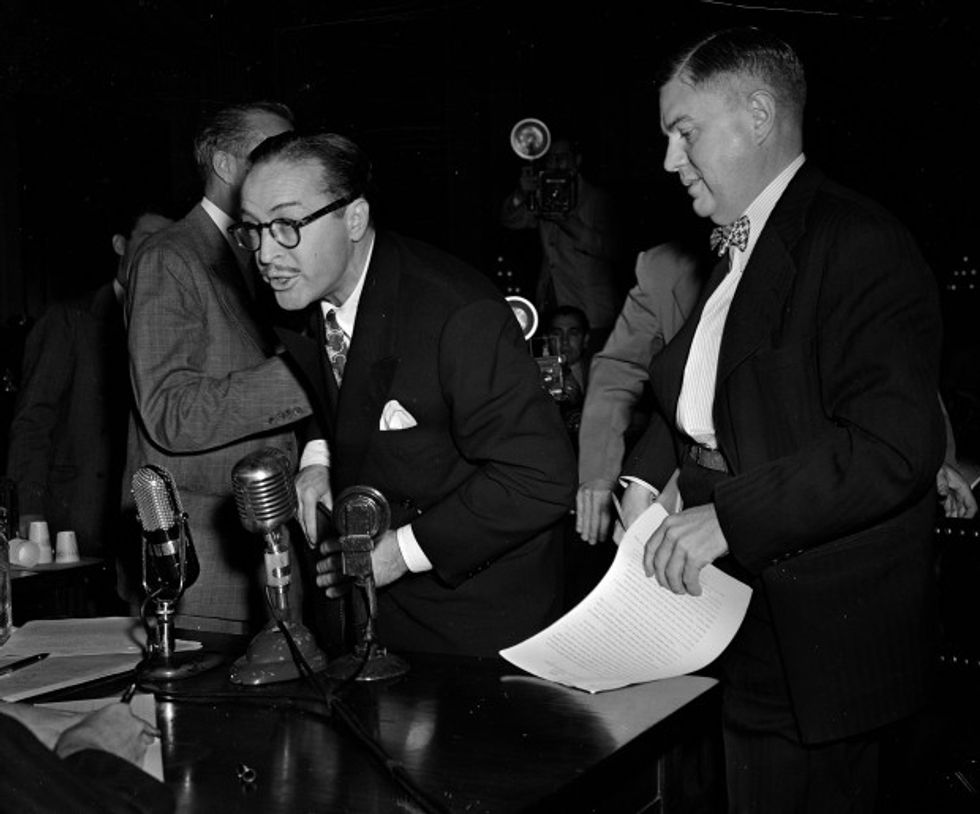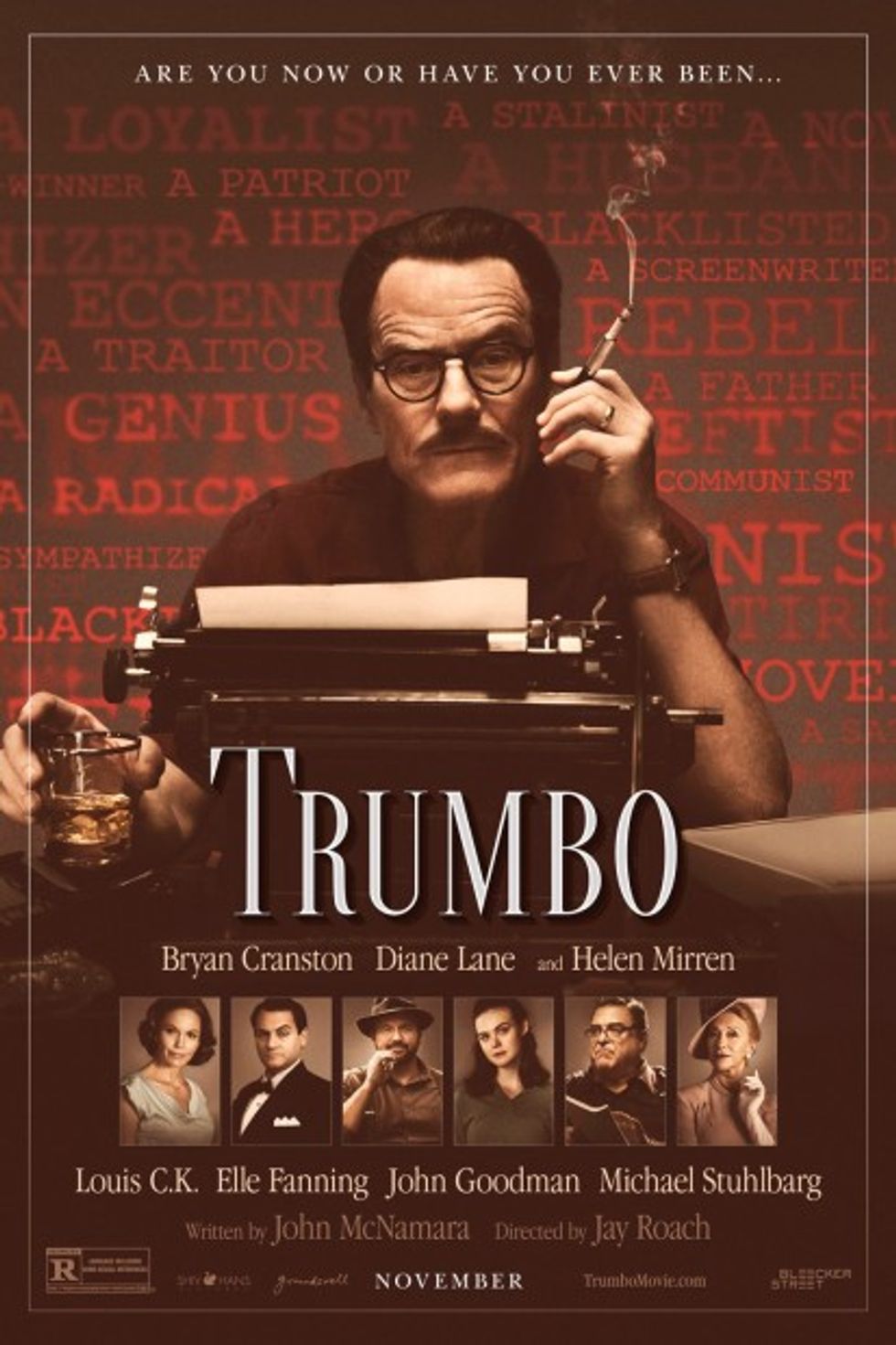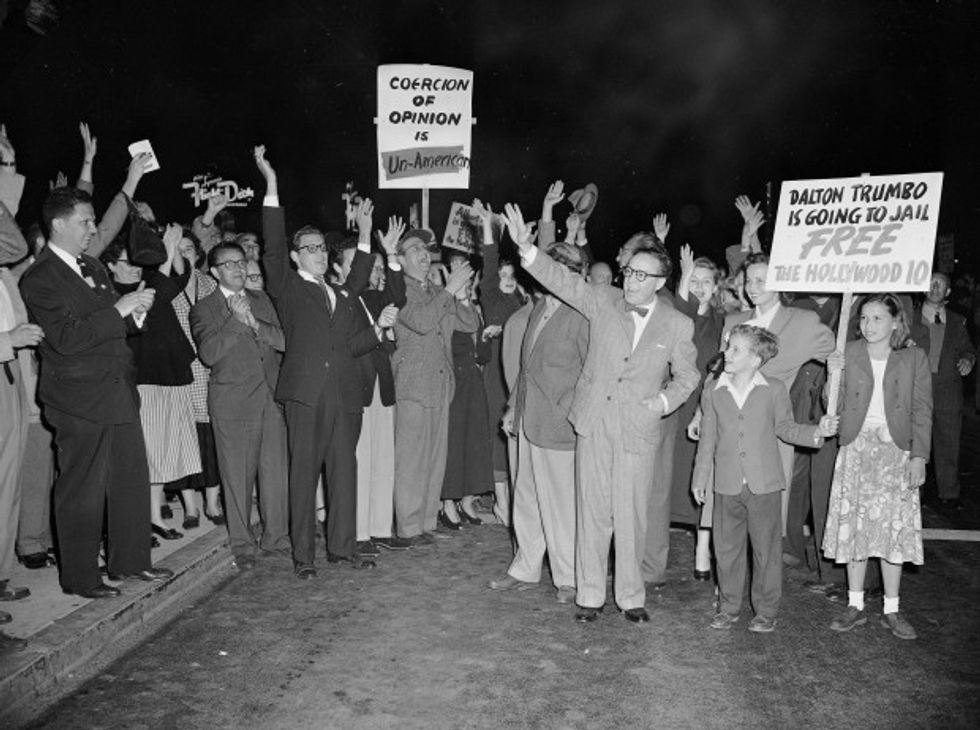
Image source: IMDB.com

Editor's note: This weekend, the newest film featuring mega-star Bryan Cranston, “Trumbo,” opens nationwide. The movie lionizes the life of Communist conspirator and screenwriter Dalton Trumbo, one of the infamous “Hollywood Ten,” who supported Stalin and Hitler, ignored genocide and sought a Red revolution to take over the U.S. government.
Below is the cover story, "Truth About Trumbo: Hollywood Is Set to Celebrate Another Stalinist Screenwriter," that appeared in the final issue of TheBlaze Magazine, which was penned by Allan H. Ryskind, senior editor of Human Events, who spent decades as a reporter and author exposing communism. He grew up in Hollywood, where is father, Morrie Ryskind, was a screenwriter for the Marx Brothers who also testified before HUAC as a friendly witness. Allan’s latest book is “Hollywood Traitors: Blacklisted Screenwriters — Agents of Stalin, Allies of Hitler.”
--

Hollywood relishes making anti-American movies, but maybe even more, loves to lavish fulsome tributes on full-blown Communists, those fellows who swooned at Joe Stalin’s feet, teamed up with Hitler as he bombed the hell out of London at the beginning of World War II and worked overtime to inflict deadly harm on America.
Back in 1997, I attended a gathering of swells at the Samuel Goldwyn Theater in Beverly Hills, where Hollywood was honoring several long-time Stalinists, including Hollywood Ten celebrity Ring Lardner Jr. and the former head of the Communist Party in Hollywood, Paul Jarrico. They received First Amendment awards, no less, for refusing to tell the House Un-American Activities Committee whether they were conspiring with the Kremlin leader to impose a Soviet-style government in America.
And “The Majestic,” starring Jim Carrey, runs regularly on TV, and in it the authors name a wonderful, patriotic town, filled with Middle-American virtues, after John Howard Lawson, Hollywood’s veteran Communist Party boss, who died yearning to see a Stalinist America.
Tinseltown is at it again, insisting that Dalton Trumbo, a major Hollywood Ten figure and longtime Stalin enthusiast, must, first and foremost, be honored as a courageous champion of our constitutional liberties.
Hollywood’s favorite Red screenwriter is to be celebrated in a new picture, “Trumbo,” which will feature Bryan Cranston, the star of the hit television series “Breaking Bad,” in the lead role. The studio’s publicity gives us more than a hint as what this film is about: that Dalton bravely took a “stand against the Communist witch-hunt at the height of the Cold War” and was “punished for his principled stand for free speech and the Constitution.” (Yes, we all know how Communists worldwide have revealed their deep commitment to the freedoms we enjoy in America.)
Actor John Wayne, labor leader Roy Brewer and the Los Angeles Times’ powerful columnist, Hedda Hopper — each of whom successfully battled the Stalinist screenwriters (including Trumbo) — will be taking major hits as well, according to the publicity.
The new Trumbo movie will almost certainly treat the revered screenwriter in much the same way Christopher Trumbo, Dalton’s late son, treated his dad in his 2008 “documentary,” also called “Trumbo” — in other words, like a glorified patriot. That film was drenched in liberal accolades, with the New York Times’ reviewer handing it the distinguished “Critics Pick.” Michael Douglas, Dustin Hoffman, Donald Sutherland, Nathan Lane and Liam Neeson are just a few of more than a dozen stars that appear in the film paying homage to this iconic figure on the Left.
As Dalton and his numerous biographers tell us, Christopher’s dad was jailed for valiantly refusing to tell HUAC in those famous 1947 hearings whether he was a Red, claiming the First Amendment shielded him from being required to answer “political” questions. He was cited for contempt, served 11 months in jail and spent a lot of dark days on the blacklist, meaning he couldn’t openly work for the studios because he refused to tell a congressional committee whether or not he was a party member. (Nine others from Hollywood, mostly screenwriters, suffered a similar fate for not answering in those same hearings whether they were party members. The nine plus Trumbo became The Hollywood Ten.)
Dalton went to Mexico for a while, suffered severe money problems, wrote Hollywood films under fictitious names and, supposedly, found grown-ups picking on his daughter because of the writer’s heroic stand against the HUAC inquisitors. He not only survived but thrived as he penned several excellent films under pseudonyms and then, in 1960, broke the blacklist, with Otto Preminger and Kirk Douglas permitting Trumbo’s own name to appear on the screen for his work on “Exodus” and “Spartacus.”
The Hollywood Left was ecstatic. Trumbo was rejuvenated with his victory, having worked his way back into movies without having to name fellow conspirators or having to apologize to anyone for his long service to the bloody tyrant in Moscow. He was the first of the unrepentant Reds to be so honored. Hollywood has loved him and eight others of The Hollywood Ten ever since. (Famed director Edward Dmytryk became an anathema when he turned against the Communist Party.)
Typical of Hollywood’s take on Christopher Trumbo’s documentary was an article by the Los Angeles Times’ Kenneth Turan, who depicted Dalton as a “contrarian” who “believed passionately in the Constitution and the Bill of Rights.” And when HUAC began to investigate his “connection to the Communist Party,” his life showed “the fearsome cost of standing up for your principles.”
And what glorious principles they were! Among them: Supporting Communist and fascist aggression across the globe and conspiring to make the United States a totalitarian Red regime. Trumbo, in truth, was a full-fledged Stalinist whose supposed love of freedom led him to side with three of the most barbarous dictators in the 20th century: Joseph Stalin, Adolph Hitler and North Korea’s Kim Il-sung. Not folks normally associated with American freedoms.

Nor did he just have “connections” to the Communist Party. He was a full-blooded Red, party card and all, who worked hard to graft a Soviet-style system, with all its lovely qualities, upon his country of birth. And he would have used force and violence — or so his utterances would suggest — if he had been summoned to do so by his boss in Moscow.
For much of his adult life, Dalton was in the hip pocket of Stalin (as, of course, was every longtime member of the Communist Party), though this is wholly obscured in the extravagant tributes he receives. I’ve read a lot of Trumbo, including two important biographies, and combed through his papers at the Wisconsin Historical Society in Madison. Yet I’ve never found a paragraph, or even a phrase, where he ever condemns the Caligula in the Kremlin, certainly not for dispatching his own citizens by the millions, egging Hitler on as he invaded Poland and the Western democracies, cheering Hermann Goering’s air force as it rained death and destruction on London, eagerly devouring Eastern and a part of Central Europe in the post World War II era, threatening Western Europe with subversion and military conquest, sandbagging American efforts to check Stalin’s aggressive foreign policy, blessing North Korea’s invasion of South Korea, etc., ad nauseam. Not a peep of public protest or regret from a man whom Hollywood longs to lionize as a champion of human freedom.
The evidence of Trumbo’s Red activities is hardly a secret today. He came clean, sort of, to his biographer, Bruce Cook, for the 1977 book “Dalton Trumbo.” He told Cook that he became a party member in 1943 (FBI informants suggest he may have joined in the 1930s), that some of his “very best friends” were Communists and that “I might as well have been a Communist ten years earlier.” He also says about joining the party: “But I’ve never regretted it. As a matter of fact, it’s possible to say I would have regretted not having done it” (emphasis Trumbo’s). No regrets about joining a party beholden to a mass murderer and global terrorist? Apparently not.
He said he let his party membership lapse after his HUAC appearance, possibly finding it difficult to pay his party dues after he was blacklisted, but he never publicly turned his back on communism or Stalin. Indeed, in his private papers archived at the Madison Historical Society, he admits that he “re-affiliated with the party in 1954,” his passion for American Communists still burning brightly. So, by the historical record and his own account, he was in tune with the Soviet Union and served as its American pawn for nearly a third of a century, during Stalin’s prime killing years.
And there is a revelatory nugget buried in those private papers of his, which could make you think he was a Stalinist to the very core of his being. He outlined some themes for a possible novel in which a couple of Russians discuss the Soviet Union from “two who love it.” When asked what he thinks of Stalin, the older Russian admits he’s a bit “afraid of him” but refuses to publicly criticize the scary figure in the Kremlin because it would “divide and betray not only Russia, but socialism itself which, however imperfectly, the SU preserves, maintains and develops” (emphasis added).
The clear message from Trumbo: The enormous horrors that Stalin visited upon the Russian people and millions of other citizens around the world — horrors that Soviet leaders themselves would later acknowledge — were very much worth the price, since socialism, you see, is making such nice headway in Moscow. Trumbo was fanatical about pushing globally the form of “socialism” that existed in Russia, remarking that he heartily endorsed socialism — meaning Moscow socialism — everywhere, whether it was “creeping, walking, running or jumping.” But socialism, so long as it was advancing, was definitely “my particular cup of tea.”
Throughout much of his life, Trumbo thundered against the huge dangers of fascism that faced America and the world, but his concern fell into deep remission when Stalin made his pact with Hitler in August of 1939. Under this devils’ agreement, Stalin gave Hitler the green light to invade Western Poland, thus setting off World War II, since England and France had repeatedly pledged to protect Poland from a German invasion. (Under the pact, Stalin seized the Eastern half.) Hitler, turning his guns against the Western democracies the following year, vanquished most of Western Europe (with Molotov sending a special congratulatory note to Hitler when he planted the Nazi flag in France) and then attempted to dispose of England with saturation bombing.
How did Dalton exhibit his great love of freedom and deeply held anti-fascist views? He sided with both Stalin and the Fuehrer, accepting the new Stalinist line that Hitler was no longer a menace to Moscow and was actually helping the Soviet Union as he was destroying the “bourgeois” nations in the West.
To ward off potential American assistance to London, which Stalin sternly opposed since he was firmly in Hitler’s corner, Dalton unleashed his polemical fury against England as it became the last major European nation still willing and able to resist the Nazis.
In his 1941 novel, “The Remarkable Andrew,” where the ghost of Andrew Jackson becomes the voice of Trumbo, he argues that England is not worthy of assistance. It’s not even a democracy, since it has a “king.” President Franklin Delano Roosevelt, a favorite of the Communists before the pact because of his anti-Nazi policy, was now guilty of “treason” and “black treason” for providing the English with military assistance in its life-and-death struggle with the German warlord. According to Trumbo, we had no real quarrel with Hitler, anyway, but with imperial England. No drop of American blood, he argued, should be risked for the selfish and deceitful British, who were causing us more trouble on the high seas than the Germans.

Trumbo not only wrote his anti-British novel, but engaged in a whirlwind of activity to ease Hitler’s burden of conquest. He publicly favored the Communist-instigated strikes against our defense industries, put on skits resuming his “treason” charge against Roosevelt and enthusiastically backed the Communist-led pickets around the White House calling for the emasculation of our military. He worked around the clock to make certain that America would be weakened militarily and rendered wholly incapable of helping any nation, group or individual facing the Nazi warlord.
His message in “Johnny Got His Gun” and “The Remarkable Andrew” was perfectly in tune with the fresh Soviet line that was coursing through the Soviet-controlled Comintern, which governed Communist parties worldwide. The Comintern’s head in 1939 was Georgi Dimitrov, who directed the CPUSA boss Earl Browder to abandon the anti-Hitler strategy. The new line was transmitted in code through a short-wave radio receiver with an attached recorder during prescribed hours in the evening. In late September and early October, with Hitler and the West now at war, Browder received two messages from the Comintern boss. Hitler, it turned out, was now a splendid partner in the spilling of innocent blood.
In the September 1939 message, Dimitrov enthusiastically informed “Comrade Browder” that the war was “driving the capitalist world into a phase of most acute and profound crisis.” Thus, as documented by Philip Jaffe in his 1975 book “The Rise and Fall of American Communism,” the fight against fascism was now “secondary,” for the main struggle was now “against capitalism,” the “bourgeoisie” and the “imperialists” in Western Europe and the United States.
There were more instructions to Browder from Dimitrov in early October, according to Jaffe. The greatest base of imperialism, the coded message explained, is in “England, France, Germany, USA. Benefit to working class if they are weakened. Hitler without knowing it leads to shattering of the bourgeoisie” (emphasis added). In short: Hitler is delivering a magnificent blow against the West, and Communists worldwide must assist him in his endeavor. The way the Soviets decided to help Hitler shatter the bourgeoisie was to suddenly downplay Nazi Germany as a global threat and demonize Hitler’s enemies — the precise tactic used by the man Hollywood intends to coronate.
When Hitler betrayed Stalin in June of 1941, launching a massive invasion of Russia, Trumbo concluded that the Fuehrer was seriously flawed after all. He was not alone among Hollywood’s Communist Party members in detecting his defects. The entire Soviet apparatus in America, which had been siding with Hitler before his brutal double cross, had suddenly realized that Moscow was in grave danger and desperately needed aid from the very powers Communists worldwide had been vilifying.
The League of American Writers, headed by mystery writer Dashiell Hammett (and lover of playwright and screenwriter Lillian Hellman, also a Communist Party member), had taken a deeply isolationist position at a mass meeting in New York in early June of 1941. The League lashed out against Europe’s “criminal war” that had been initiated for “profits, territories and markets” and voted to send a large delegation of writers to join the picketing of the White House by one of Trumbo’s favorite organizations, the American Peace Mobilization.
For nine months, this Communist organization that Dalton had so lovingly embraced had been ferociously bashing Roosevelt’s efforts to rebuild our defenses and assist Great Britain as a policy that would transform America itself into a fascist state. But when Hitler betrayed Stalin, the league, through Hammett, issued an urgent call in late June to league writers to take “immediate and necessary steps in support of Great Britain and the Soviet Union to insure the military defeat of the fascist aggressors.” (See New York Times, July 27, 1944.)
The APM, which in March had informed its followers that an “English victory will result in the same sort of imperialist, anti-democratic peace as will a Nazi victory,” was now urgently demanding that the United States support the “people of Great Britain and the Soviet Union” and, in fact, “all people in their fight against Nazi Germany.” This was a policy somersault worthy of The Flying Wallendas, which Trumbo managed to nimbly execute. Though his Red friends said he was initially reluctant to embrace the new policy because of his “pacifist” views, Trumbo, according to the FBI, informed two of its agents on Jan. 8, 1944, that he had retained a non-confrontational posture toward Nazi Germany “until June 22, 1941,” the day of the Soviet invasion.
That Trumbo ever considered himself cut from the same cloth as Mahatma Gandhi has to be met with giant gobs of skepticism. He was all in favor of the American brigades fighting on the Soviet side during the Spanish Civil War in the 1930s. Even in his anti-war novel, “Johnny Got His Gun,” the hero is hardly a pacifist, since he calls upon a nation’s citizens to rise up and murder the governing class if it sends them off to war. And few in Hollywood seemed to enjoy World War II as much as Trumbo, as he avidly pushed for America to open that second front that Stalin was demanding to save the Soviet Union. He also revealed in the pages of The Screen Writer, the influential Screen Writers’ Guild publication, how exhilarated he was to join a combat mission that dumped bombs on “the Japs,” as he called our Asian enemy. Nor was he preaching “pacifism” when he cheered North Korea’s invasion of South Korea in 1950.
His attitude toward Martin Luther King Jr. is instructive in this regard. King’s nonviolent demonstrations had led to a national civil rights revolution, with Congress having enacted into law the 1964 and 1965 acts that ended Southern segregation and guaranteed Southern blacks the right to vote.
A new Trumbo biography (“Dalton Trumbo”) by Larry Ceplair and Christopher Trumbo shows that Trumbo appeared rather dismissive of King’s political path, insisting in 1968 that Nat Turner, who led a bloody slave rebellion in 1831, was “a far more contemporary figure than Martin Luther King. ... In his resort to violence, Nat Turner is truly a man of the Twentieth Century which Martin Luther King, unhappily, is not.”
His “pacifist” or “anti-war” message in “Johnny Got His Gun,” which during the pact period was serialized in the party’s official publication, the Daily Worker, was aimed at turning America against the potential victims of Nazism and those eager to help desperate nations resisting Hitler, not at the Germans who were perpetrating the aggression. And Trumbo did not aim his propaganda at the Soviets, who, under the pact’s provisions, were consuming the Eastern half of Poland, large portions of Finland and all of the Baltic states.

It’s hard to think of any political activity that Trumbo was ever seriously involved in that was not designed to help the Soviet Union subjugate other nations and repress its own people—certainly not in the late 1930s or during the Hitler-Stalin Pact or during virtually all of World War II. Nor during the Cold War. Even super-liberal organizations such as the Americans for Democratic Action were blacklisting American Communists from their groups in the late 1940s, since they knew Stalin and his Fifth column in America were our deadly enemies. But the Hollywood Reds that the movie industry continues to honor never really turned their backs on Stalin.
When Earl Browder was deposed as Communist Party chieftain in 1945 for uttering several Communist heresies, including the idea that there could be a peaceful path to socialism in the United States after the war, Trumbo joined the lynch mob, remarking, “It comes down to this, if Lenin was right, then Browder was wrong—and vice versa. I prefer to believe that Lenin was right.” And Stalin, too.
When editing The Screen Writer in the mid-1940s, Trumbo turned the publication into a virtual Red propaganda organ, with the aid of party members Gordon Kahn (managing editor) and Harold J. Samuelson (editorial secretary). The Screen Writer championed Moscow’s war aims, hailed Red screenwriters and their movies celebrating Stalin, lavished praise on Hollywood’s Red guilds and unions and launched scathing attacks against the anti-Communist community. Even Trumbo’s favorable biographer, Bruce Cook, concedes, “Under his editorship, The Screen Writer was strongly weighted to the left.” (Hard to miss, really.)
Those who criticized the Soviet Union were quickly tagged by Trumbo with the “fascist” label. Winston Churchill was freedom’s Paul Revere in alerting the world to the dangers of Nazism. But when he warned against Soviet imperialism in that famous 1946 speech in Fulton, Missouri, Dalton immediately suggested he was a latent Nazi sympathizer, insisting that “anti-Communism is the first objective of fascism.”
When Kim Il-sung’s North Korea attacked South Korea in 1950, with major assistance from Moscow, Trumbo jumped at the chance to script a film saluting the Communist state, which even the United Nations had labeled an aggressor. The movie idea, called “An American Story,” a copy of which this author possesses, sprang from the fertile mind of Herbert Biberman, who, along with Adrian Scott and Paul Jarrico, had formed the Independent Production Corporation (IPC), a body eager to produce pro-Communist and pro-Stalinist films. Both Biberman and Scott, like Trumbo, were fellow Hollywood Ten members, with Jarrico also a solid Red who would lead the Hollywood chapter of the Communist Party in the 1950s.
According to the Ceplair/Trumbo biography, Biberman urged Dalton to do a film about a child custody case involving Jean Field, whose ex-husband had claimed his wife was teaching his children “Communist ideology.” In one letter to her children, she expressed, “her support for the People’s Democratic Republic of Korea and criticized those who directed the policies of the United States, which supported fascism the world over.” In her second letter, she said, “We are all so proud of the people’s army in Korea.” After meeting with her, Trumbo was eager to do the script, totally embracing Jean Field’s Mary Poppins’ view of North Korea as a model nation for all of Asia to emulate.
When the Hollywood Communists put on their horror show before HUAC in 1947, likening committee members to Gestapo agents and refusing to respond to legitimate questions, respectfully posed, the studio executives laid down a rule: Those who refused to say whether they were party members and conspiring with our enemies in Moscow could no longer work in Hollywood. Trumbo stood with his fellow conspirators and Stalin. He never offered the slightest apology, no doubt hinking like the Russian character he proposed for his novel, the one who loved the Soviet Union so much he would never say a bad word about Joe Stalin.
Why does mainstream Hollywood continue to honor such proven enemies of freedom?